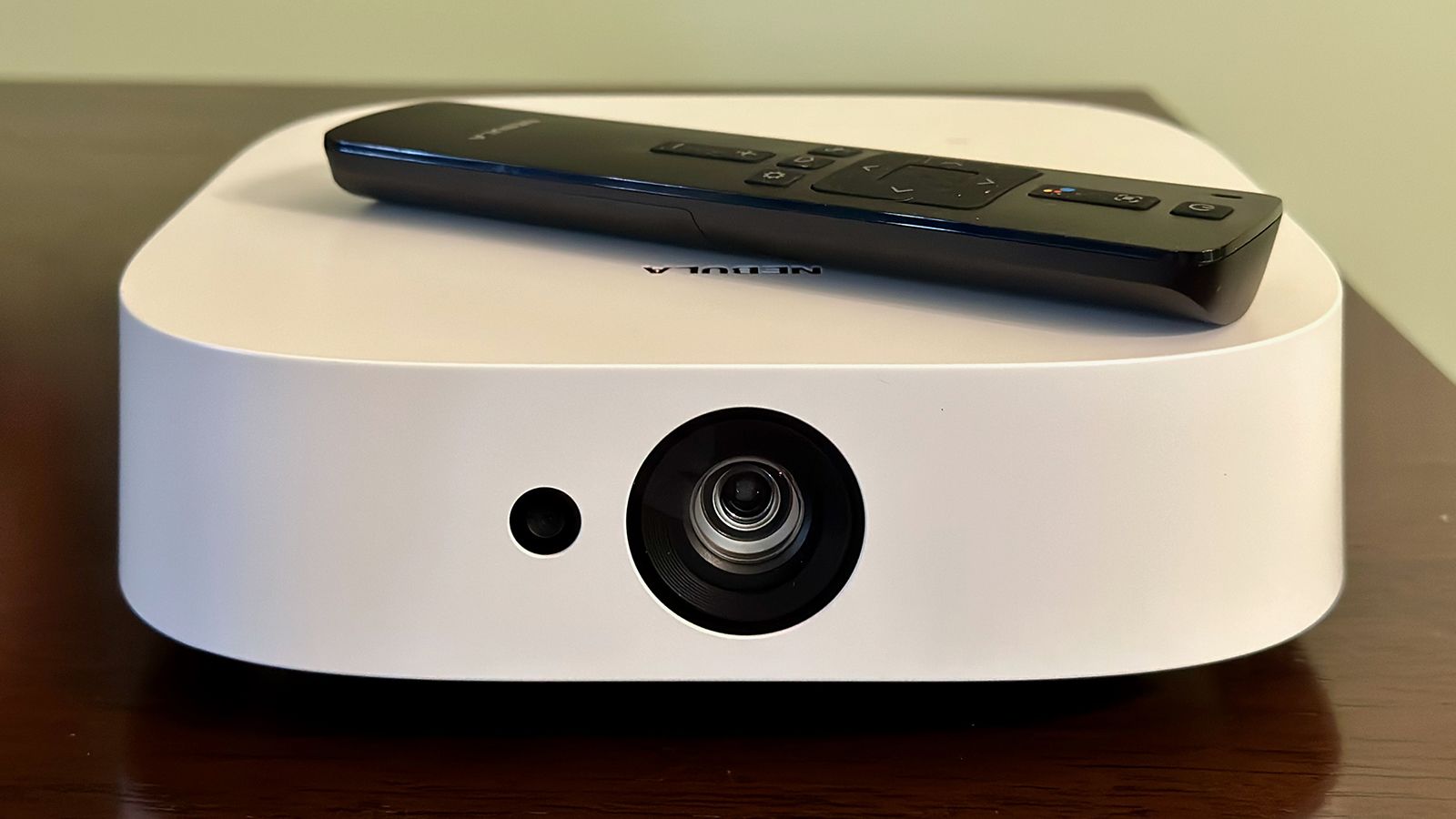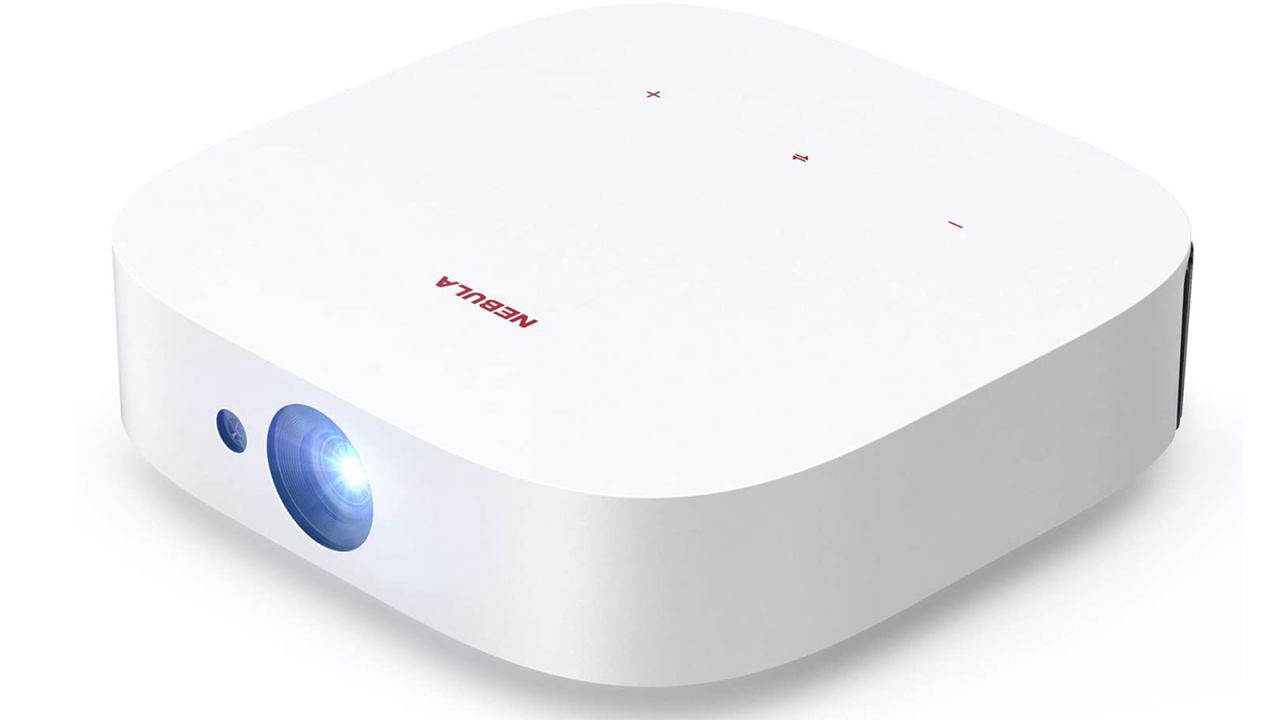Budget-friendly, ultra-portable projectors may not offer the stellar picture quality of their more expensive brethren, but they make up for it with portability and simplicity. We picked the $559 Anker Nebula Solar Portable projector for its balance of price, picture and portability.
It’s a friendly little thing and makes no attempts at presenting as Serious A/V Equipment. It’s squat and white, owing a bit of design to Eve from “WALL-E,” in my opinion. But don’t be fooled: This is a capable little projector in a highly portable package. Let’s dig in.
What we liked about it

Acceptable 4K and Netflix
First of all, the picture. It can project a 120-inch image at 1080p with HDR10 color at 400-lumen brightness. That won’t hold a candle (heh) to the XGIMI Horizon Pro or the Epson EpiqVision projectors we’ve reviewed, but those models are also more expensive and less explicitly designed for casual movie nights. Still, the Solar Portable can throw up some pretty good images when the nights get cool and dark.
While it’s still a 1080p projector, it can accept and downconvert 4K input, meaning much of your 4K content will look fine but with a softer edge. Most portable projectors don’t support 4K at all.
Second, unlike many projectors, this one will support Netflix — after a fashion. You’ll need to download the Nebula Connect app, which turns your phone into a remote control for the projector. (The projector comes with a lightweight, physical remote control, but for downloading Netflix, you’ll need to use the phone app.) I could not only download and install a mobile version of Netflix, but it also allowed me to download episodes to the projector’s 5GB internal storage, making its portability even more versatile.
It runs on Android TV 9, so setup is easy if you have an Android phone. You’ll have to hunt and click on the onscreen keyboard with your various logins and passwords if you’re on an iPhone. But, as I’ve said in other reviews, this should be a one-time chore.
Take it anywhere — no, really
There’s a heady feeling of freedom knowing you get up to three hours of battery life from the Nebula Solar’s built-in lithium ion battery. And since it uses USB-C to charge, you can power it with a portable charger. The brightness will adjust based on whether you’re on AC power or battery. You can override this if you’re looking to boost the brightness and cut battery life to one and a half hours. Plus, the Solar Portable is light enough to be tossed in a backpack. It’s incredibly versatile, which I think is its real superpower.
Finally, this is a minor thing, but it’s got an adjustable lever on the bottom that allows you to manage the tilt of the projector by up to 13 degrees. So many bigger and burlier projectors don’t bother with this, so I thought it was a nice touch.
What we didn’t like about it

Just OK sound
Bearing in mind that this is a budget projector and isn’t a high-end A/V unit, we found the 3W speakers to be a bit on the meh side. By design, most projectors’ speakers leave something to be desired, and the Solar Portable is no exception. You’ll want to pack an extra Bluetooth speaker to beef up the sound. On the other hand, the Solar Portable itself can double as a Bluetooth speaker with the touch of a button on the top of the unit — but, again, your mileage will vary.
Not too bright
While the picture is decent in a dark environment, you’ll probably be happier watching something bright and active — maybe “She-Hulk”? — over some dark crime drama. Avoid French cinema,?which is mainly people being mean to each other in the rain anyway.
As you would expect from a lower-budget device, its automatic adjustments are also lacking. Automatic keystone adjustment can only handle the vertical aspect, and the manual corner adjustment is limited to just four corners. (More advanced projectors let you adjust eight or more points on the image.)
How it compares
| Dimensions | 7.6 x 7.6 x 2.3 inches |
4.7 x 7.7 x 7.3 inches |
5.75 x 4.15 x 0.14 inches |
|---|---|---|---|
| Weight | 3.08 pounds |
3.53 pounds |
1.98 pounds |
| Native Resolution | 1920 x 1080 |
1280 x 720 |
1920 x 1080 |
| Brightness | 400 lumens |
300 lumens |
300 lumens |
| Image | Up to 120 inches |
Up to 135 inches |
Up to 200 inches |
| Audio | 3W stereo |
4W stereo |
3W stereo |
| Inputs | HDMI 2.0, USB-A for flash drives, USB-C for charging |
HDMI x 2, with internal HDMI |
HDMI (ARC supported), USB |
| Connections | Bluetooth, Wi-Fi |
Bluetooth, Wi-Fi |
Bluetooth, Wi-Fi |
| Streaming | Chromecast |
AirPlay, Chromecast |
Chromecast |
| Power | 3 hours on battery, USB-C power |
2.5 hours, DC in |
2.5 hours, DC in |
| Software | Android TV 9 |
Android TV 10 |
Android TV |
| Price | $559.99 | $499 | $499 |
Bottom line
No, the Anker Nebula Solar Portable doesn’t have as good a picture as the XGIMI Horizon Pro (which costs up to three times more), nor does it have the sound quality of the Epson EpiqVision’s Yamaha Speakers. But there’s a lack of pretension with this projector that I find refreshing.
It’s light, it’s self-contained and it does all that’s expected of it without flash or drama. I could see myself throwing this in a bag with a USB stick full of nature documentaries and throwing them up on a sheet strung between two trees while camping. And, with the easy-to-use solar-powered USB portable charger, I could quickly charge this little guy when it started to poop out. All in a day’s work, which is just what you need with any portable projector.

















